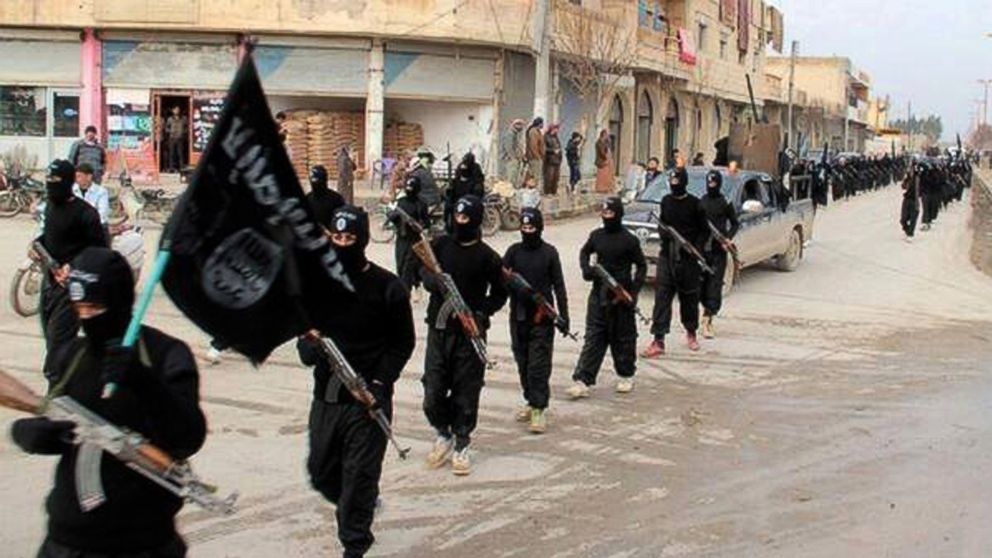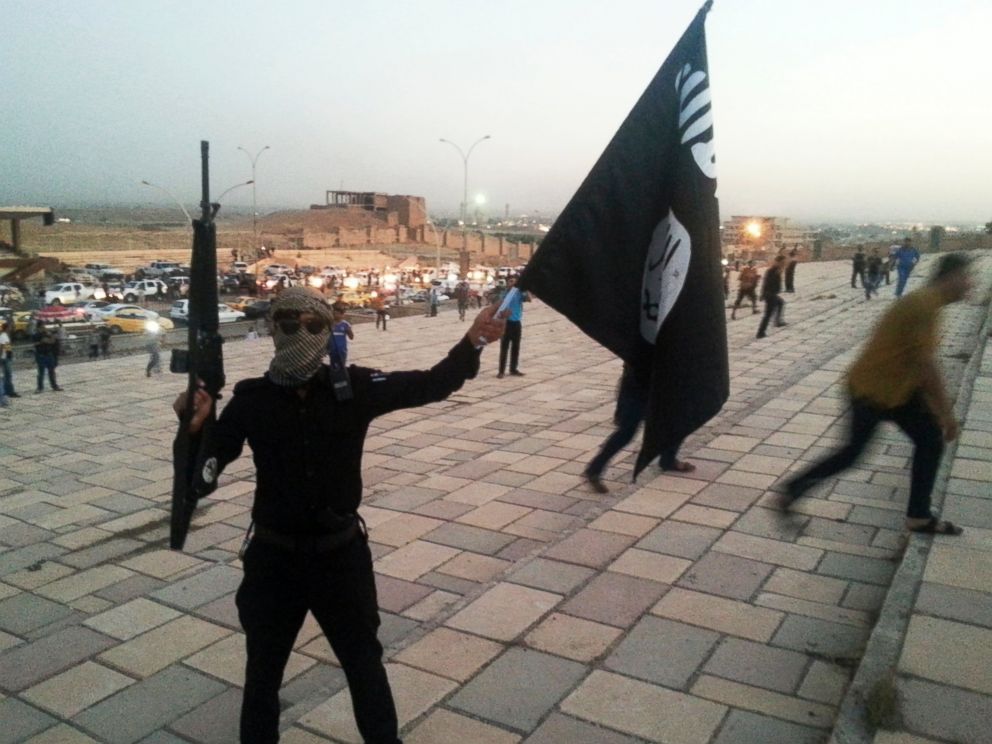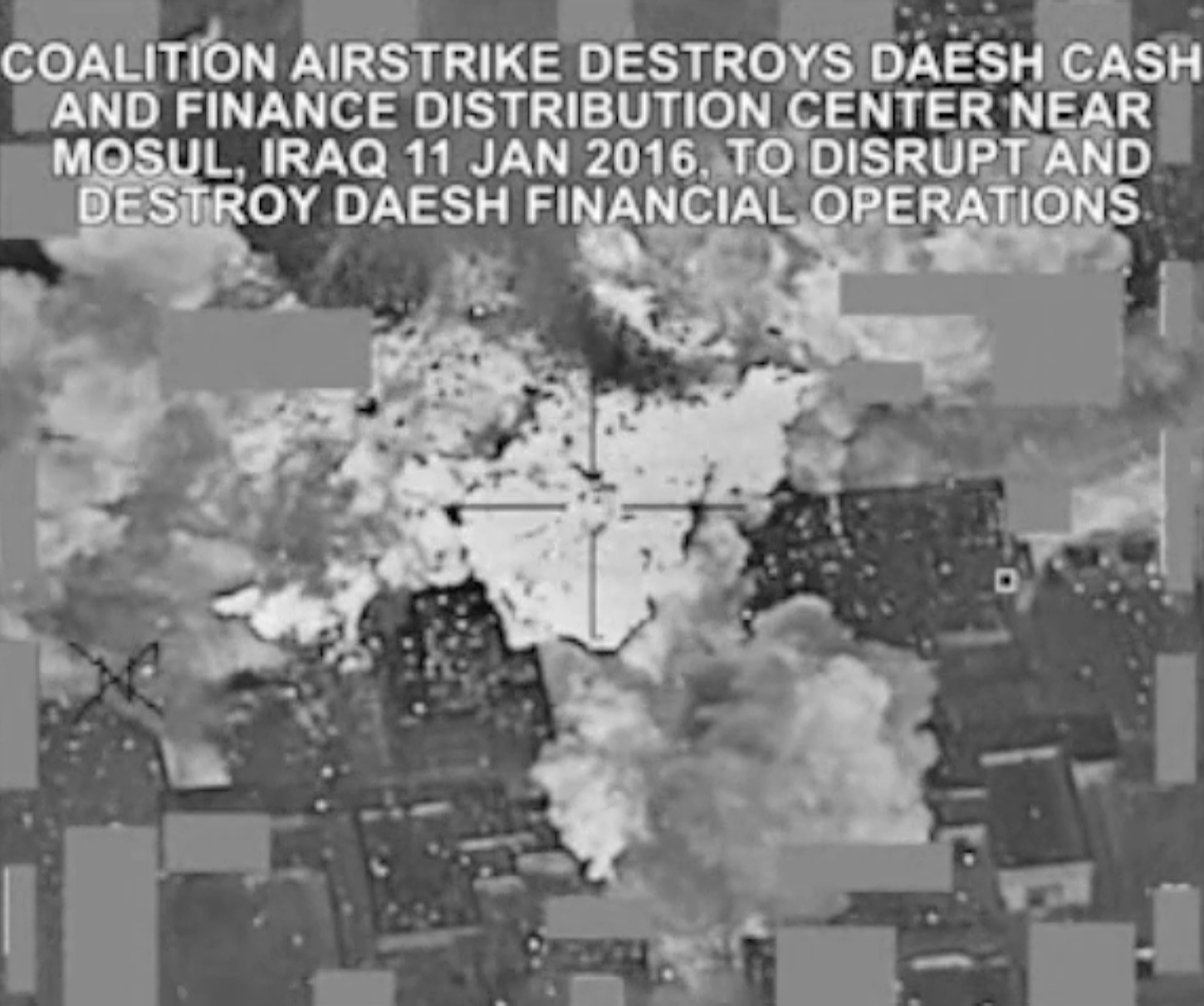One Third of Iraqis Think US Supports Terrorism, ISIS
Officials, analysts see Iran’s hand in stubborn conspiracy theories.

— -- Despite the United States spending billions of dollars and spilling American blood in the fight against ISIS, as many as one third of Iraqis believed as recently as last fall that the U.S. “supports terrorism in general or ISIL [ISIS] specifically,” according to a recent U.S. State Department report. Forty percent of the country said the U.S. is purposefully “working to destabilize Iraq and control its natural resources.”
The figures come from State Department polling cited in a State Inspector General report that was published online last week. The report, which used data from October to November 2015, focused on how well the U.S. Embassy in Baghdad was implementing the sixth of nine directives from the Obama White House’s strategy to counter ISIS, namely, “Exposing [ISIS’s] True Nature." While the report found that the embassy was working diligently to counter ISIS’s messaging, mostly with America’s own information about coalition military victories, the White House directive didn’t exactly apply as written.
The Iraqi public, the report says, is “keenly aware of [ISIS’s] true nature” and the polling showed that “nearly all Iraqis have unfavorable views of [ISIS] and oppose its goals and tactics, with no significant variation across religious sects and ethnic groups.”
But the report also found U.S. didn’t fare much better than the murderous terror group in the minds of one third of Iraqis, who said they believed the U.S. directly supports ISIS or other terror groups. The report adds that the U.S. “image among Iraqis has fallen from 38 percent favorable in December 2014 to 18 percent in August 2015.”

It’s a phenomenon the State Department blamed on “active disinformation campaigns” and “residual suspicions about U.S. policy that undermine its messaging” -- “themes” not spread by ISIS, but ones that “receive considerable play in the Iraqi media.” Experts and analysts told ABC News the conspiracy theories were the product of everything from general paranoia to a concerted campaign, covered in Iranian fingerprints. A top Iraqi official, however, said some powerful voices in Washington are at least partly to blame for the spread of such a devastating “myth.”
The report drew from information from last fall, before ISIS saw a series of more recent defeats, which could mean opinion of the U.S. has risen and consequently dampened the conspiracy theories in the interim. Mike Lavallee, a spokesperson for the State Department, said he’s unaware of any more recent State Department polling, however.
'It’s Like "Wag the Dog", Right?'
Jon Alterman, director of the Middle East Program at the Center for Strategic and International Studies, said he was “not at all” surprised at the widespread anti-U.S. conspiracy theories in Iraq and said that it’s mainly the product of two different portions of the population: general “rabid conspiracy theorists” in Iraq, who believe the U.S. created ISIS as an excuse to keep a “footprint” near Iraq’s oil; and a number of Shi’a Muslims in Iraq, who see any support for Iraq’s Sunni population -- like U.S. support for an inclusive Iraqi government -- as de facto support for ISIS, which is made up of Sunnis.
“So if you put those two groups together…that gets you to 33 percent real quick,” Alterman told ABC News. “What they see is the U.S. government saying ‘Stay open to the Sunnis’ and the U.S. government keeps talking about having more troops in Iraq. There are people who argue... that means the U.S. is creating this environment to serve its own interests.
"It’s like 'Wag the Dog', right?” he said, referring to a dark comedy in which American politicians manufacture a military conflict to distract from a domestic scandal.
Despite virtually daily air operations against ISIS with a price tag topping $6.5 billion and the occasional high-risk special operations raid with Kurdish forces, Alterman said that Iraqis are likely not “seeing something that they consider incontrovertible truth that we’re actually fighting ISIS.”

Rather, they hear rumors about the U.S. dropping supplies and water to ISIS-held positions -- which may have happened at least once by accident. In a report about the conspiracy theory phenomenon in December, The Washington Post quoted a Shi’a militia leader saying “it is not in doubt” that the U.S. is supporting ISIS and that his friend saw an airdrop to ISIS.
The (Semi-)Hidden Hand of Iran
In the Post report, U.S. military spokesperson Col. Steve Warren laid much of the blame for such stories on Iran and “the Iranian-backed Shiite [Shi’a] militias” in Iraq who are “really pushing this line of propaganda.”
Phillip Smyth, a researcher at The Washington Institute focusing on Shi’a Islamist militarism, agreed with Warren and said that much of the disinformation has its roots in Iran-produced messages dating back to the mid-2000s.
The long-sought goal, Smyth told ABC News, has been to minimize U.S. influence and maximize Iranian influence in Iraq by turning the majority Shi’a population against America.
“There has been an engineered campaign…the Iranians have been playing us the entire time,” he said Tuesday. “They have been pushing that the U.S. is behind the growth of extremist Sunni jihadis that go out and kill other Muslims, and they have been pushing this line from the start.”
An Iraqi official said it was “fair to say that Iran has been pushing the narrative about the U.S. supporting ISIS.”
A search of Iranian semi-official news sites leads to several articles in which the sites quote “analysts” or “experts” on the U.S. government’s purported complicity in the creation, rise and survival of ISIS – an idea that has spread to Western conspiracy theory sites as well.
The stories, especially the American resupply stories, are also spread by Iran-backed television, radio and news outlets in Iraq and by some Iran-backed Shi’a militia leaders, like the one who spoke to the Post, according to Smyth, who tracked such reports. A common refrain is a claim that the U.S. is powerful enough that if it really wanted to destroy ISIS, it could in short order. Since it does not, the two must be in collusion – more nuanced policy positions be damned.
“That’s the stuff that sells. A lot of this stuff gets into [Iraqi] papers and into the mouths of popular [Iraqi] politicians” who are not necessarily connected to Iran, Smyth said. “It’s the second order of things – how it filters down to the population, how it affects others. If you hear a message long enough…it will start to resonate.”
Iraqi Official: American Politicians Fuel ‘Myth’
Another Iraqi official, Lukman Faily, the Iraqi ambassador to the U.S., acknowledged the problem and told ABC News that part of blame also rests with powerful people within America’s own borders and the way Americans frame discussions about Iraq.
“A number of factors fuel the myth among Iraqis that the U.S. is supporting Daesh [ISIS]. Iraqis pay close attention to what members of Congress, analysts, and journalists say about Iraq, and their views are seen as somehow representing the policy positions of the United States. When some Americans publicly mock Iraqi troops, question their will to fight, and use derogatory terms like ‘Shi’a militia’ to describe volunteer fighters, it only fuels the perception that the U.S. is not on their side,” Faily said in a written statement. “You have to appreciate that Iraqis naturally find this sort of language insulting, given the immense sacrifices on the ground each day. Americans show utmost respect for their servicemen and women, and Iraqis expect nothing less for their own sons and daughters.”
Faily said that, for instance, suggestions about creating a “three state solution” for Iraq, versions of which were proposed last summer by Sen. Joe Manchin, D-W.Va., and floated back in the mid-2000s by then-Sen. Joe Biden, is seen as the U.S. “undermin[ing]” Iraq’s sovereignty.
“This only reinforces the view that the U.S. is supporting [ISIS] in order to break up Iraq,” Faily said.
‘Looking for Gratitude…Is a Fool’s Errand’
Faily said the “best way to overcome this myth is for the U.S. to continue to demonstrate that it is playing a prominent role on the battlefield in supporting Iraqi forces to liberate towns from [ISIS]… But the discourse coming out of Washington is important too. Iraqis follow what is being said much more closely than you might expect.”
Lavallee, the State Department spokesperson, told ABC News the department is “continuously working to counter deceit and propaganda that misrepresents our counter-ISIL [ISIS] efforts, through numerous outreach opportunities and bilateral programs run by our diplomatic mission in Iraq as well as direct media engagements and the use of social media platforms, which highlight our goals and achievements.”
“We will continue to accelerate our campaign for [ISIS’s] defeat and work with our partners to counter disinformation and half-truths that only serve to make our shared goal of defeating [ISIS] more challenging,” he said.
A few months after the poll was taken, the State Department “revamped” its “counter-violent-extremist communications efforts” with a new “Global Engagement Center” -- though the official description of that center indicates it will focus more on countering ISIS and al Qaeda messaging.
The propaganda appears to stick in Iraqi circles, and Alterman said that in the end, the U.S. government can do relatively little about that, beyond tempering its own expectations.
“I think looking for gratitude is not going to get us anywhere, chasing people to be grateful and appreciate the role and sacrifice we’ve made is a fool’s errand,” he said.




